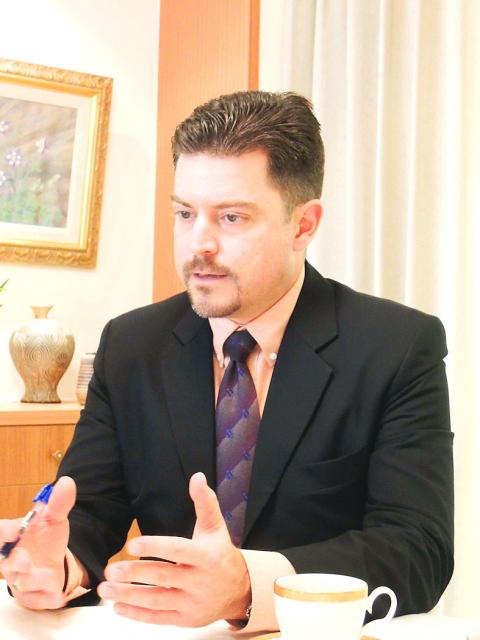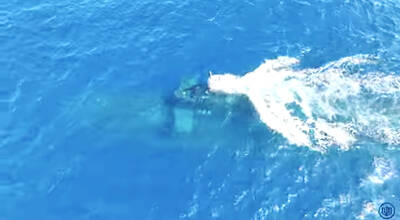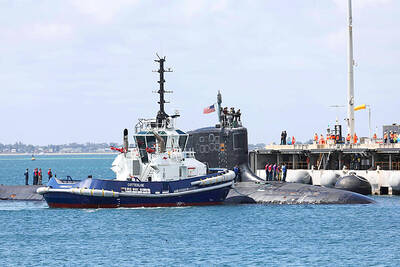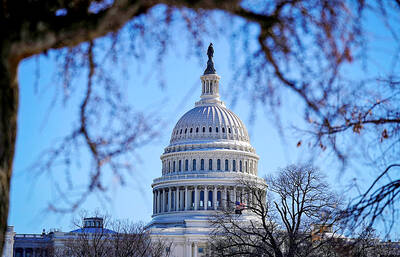The raising of the Republic of China (ROC) flag at Twin Oaks Estate in Washington continues to cause diplomatic ripples between Taiwan and the US, with Washington seeking reassurance that such an incident will not happen again.
The US hopes that Taiwan will “demonstrate the priority it puts on the US-Taiwan relationship by ensuring that these kinds of things do not happen again,” American Institute in Taiwan (AIT) spokesman Mark Zimmer said yesterday in Taipei.
Zimmer’s remarks could be seen as a blow to Representative to the US Shen Lyu-shun’s (沈呂巡) statement on Wednesday that he hopes to continue raising the ROC flag on special occasions at Twin Oaks, the residence of the nation’s official representative to the US.

Photo: Ke Yu-hao , Taipei Times
Speaking at a meeting of the legislature’s Foreign and National Defense Committee, Shen said the ROC flag should be able to fly at Twin Oaks to commemorate the 70th anniversary of the end of World War II — which Shen referred to as the (Anti-Japan) Resistance War — or fly at half-mast to commemorate the Nanjing Massacre.
“And they are not supposed to be opposed by the Chinese government,” he added.
While lauding Shen’s patriotic act, Democratic Progressive Party (DPP) lawmakers frowned on his suggestions which smack of Chinese nationalism, reminding Shen that he is an envoy appointed by the Republic of China and not by the People’s Republic of China.
When asked whether he would be willing to commemorate the 228 Massacre as well, Shen said: “Certainly.”
However, the AIT’s public statement has put a damper on all these ideas.
Zimmer yesterday said that the US “did not approve or know about the Jan. 1 flag-raising at Twin Oaks in advance” and, as US Department of State spokesperson Jen Psaki had said, the US is “disappointed with this action.”
“We have raised our serious concerns with senior Taiwan authorities in Taipei and Washington,” Zimmer said, adding that the US hoped Taiwan would make sure such an incident would not happen again.
The remarks could be seen as an admonishment as Washington steps up the pressure on Taipei.
On Tuesday, Psaki had tempered her comments, saying only that the US “is disappointed with the action” and that “the flag-raising ceremony violated our longstanding understanding on the conduct of our unofficial relations.”
“We have a robust set of cultural relations, but we do not have diplomatic relations. And we’ll continue to discuss this with the proper officials,” Psaki said.
Ministry of Foreign Affairs spokesperson Anna Kao (高安), when asked about the AIT’s statement, said that Taipei would continue to discuss the matter with Washington.
“Both Taiwan and the US value greatly the longstanding cooperative relationship between the two sides and will continue strengthening it in the future,” Kao said.

CSBC Corp, Taiwan (台灣國際造船) yesterday released the first video documenting the submerged sea trials of Taiwan’s indigenous defense submarine prototype, the Hai Kun (海鯤), or Narwhal, showing underwater navigation and the launch of countermeasures. The footage shows the vessel’s first dive, steering and control system tests, and the raising and lowering of the periscope and antenna masts. It offered a rare look at the progress in the submarine’s sea acceptance tests. The Hai Kun carried out its first shallow-water diving trial late last month and has since completed four submerged tests, CSBC said. The newly released video compiles images recorded from Jan. 29 to

DETERRENCE EFFORTS: Washington and partners hope demonstrations of force would convince Beijing that military action against Taiwan would carry high costs The US is considering using HMAS Stirling in Western Australia as a forward base to strengthen its naval posture in a potential conflict with China, particularly over Taiwan, the Wall Street Journal reported on Saturday. As part of its Indo-Pacific strategy, Washington plans to deploy up to four nuclear-powered submarines at Stirling starting in 2027, providing a base near potential hot spots such as Taiwan and the South China Sea. The move also aims to enhance military integration with Pacific allies under the Australia-UK-US trilateral security partnership, the report said. Currently, US submarines operate from Guam, but the island could

RESTRAINTS: Should China’s actions pose any threat to Taiwan’s security, economic or social systems, China would be excluded from major financial institutions, the bill says The US House of Representatives on Monday passed the PROTECT Taiwan Act, which states that Washington would exclude China from participating in major global financial organizations if its actions directly threaten Taiwan’s security. The bill, proposed by Republican Representative Frank Lucas, passed with 395 votes in favor and two against. It stipulates that if China’s actions pose any threat to Taiwan’s security, economic or social systems, the US would, “to the maximum extent practicable,” exclude Beijing from international financial institutions, including the G20, the Bank for International Settlements and the Financial Stability Board. The bill makes it clear that China must be prepared

Taiwanese trade negotiators told Washington that Taipei would not relocate 40 percent of its semiconductor production to the US, and that its most advanced technologies would remain in the nation, Vice Premier Cheng Li-chiun (鄭麗君) said on Sunday. “I told the US side very clearly — that’s impossible,” Cheng, who led the negotiation team, said in an interview that aired on Sunday night on Chinese Television System. Cheng was referring to remarks last month by US Secretary of Commerce Howard Lutnick, in which he said his goal was to bring 40 percent of Taiwan’s chip supply chain to the US Taiwan’s almost